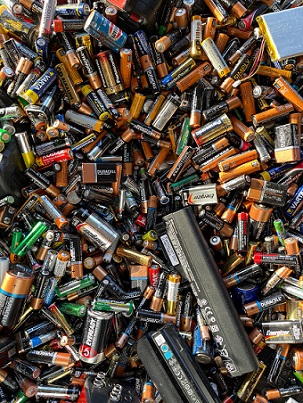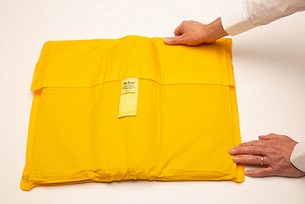 Old lithium batteries are known as zombies as they can come back to life and burst into flames
Old lithium batteries are known as zombies as they can come back to life and burst into flames
 An AvSax lithium battery fire containment bag. This technology can be harnessed to deal with batteries in recycling centres.
An AvSax lithium battery fire containment bag. This technology can be harnessed to deal with batteries in recycling centres.
 All these gadgets are powered by lithium batteries
All these gadgets are powered by lithium batteries
 Fires caused by lithium batteries have caused millions of pounds damage to recycling centres
Fires caused by lithium batteries have caused millions of pounds damage to recycling centres
 AvSax won the Queen’s Award for Enterprise for its outstanding innovation
AvSax won the Queen’s Award for Enterprise for its outstanding innovation
Lithium batteries spark more than 300 fires in recycling and waste plants in the UK every year causing millions of pounds worth of damage.
Now award-winning technology used to deal with overheating or burning lithium-ion batteries on passenger aircraft is being harnessed to try to stop the high fire toll in recycling centres.
AvSax lithium battery fire containment bags are now on more than 15,373 aircraft operated by 80 airline companies so if any personal electronic device such as a mobile phone, laptop or iPad catches fire due to its lithium batteries overheating, it can be put in the AvSax along with water which will contain the heat and smoke. It will even withstand the force of a blast if the device explodes.
Although all batteries can be recycled, the recycling rate for them is only around 45% meaning 55% - that’s tens of millions of batteries – are being thrown into household waste, causing a potentially massive fire hazard.
Dead batteries thrown away with other waste and recycling - known as ‘zombie batteries’- are likely to be crushed or punctured once the waste is collected and processed.
This can cause them to catch fire or even explode and recycling plants are full of highly combustible material such as cardboard and paper so a small fire can quickly become a raging inferno. Even jostling them around on conveyor belts can be enough to set them off.
When the barrier between a battery’s cathode and anode ruptures it can lead to a thermal reaction known as thermal runaway which can cause the battery to heat up exceptionally quickly and catch fire.
According to waste and recycling company Veolia: “Up and down the country fires are happening in the back of recycling and waste vehicles and at waste facilities due to the incorrect disposal of batteries. YouGov research has brought to light that shockingly only 43% of the public realise that, if damaged, lithium-ion batteries can spark fires.”
Many people still throw batteries into the general waste rather than taking them to supermarkets which usually have collection boxes for batteries.
Few think to remove them from battery-powered toys and other electronics equipment before throwing them away. In short, people should never throw batteries away in their general or recyclable rubbish.
Fires in recycling works can also last for days, causing enormous environmental damage.
In August 2018 there was a huge fire at the Guernsey Recycling site on the Channel island of Guernsey which took 13 hours to douse and is believed to have started when a mechanical claw crushed a lithium battery.
Lithium batteries are found in products like laptops, tablets, mobile phones, radio-controlled toys, Bluetooth devices, shavers, electric toothbrushes, power tools, scooters, e-cigarettes and, er, sex toys.
UK recycling and waste management trade organisation the Environmental Services Association carries out an annual survey of its members to record the proportion of fires at recycling and waste facilities that are known or thought to have been started by lithium-ion batteries.
Between April 2019 and March 2020 the proportion of all fires reported at ESA members’ recycling and waste facilities suspected to be caused by lithium-ion batteries alone rose from around a quarter of all fires to more than a third (38%) year on year – that’s around 250 fires.
In many cases the precise cause of a fire is never confirmed so it’s highly likely that batteries are responsible for an even greater proportion of fires at recycling centres.
ESA executive director Jacob Hayler said: “Unfortunately, the majority of batteries thrown away in the UK at the moment are not recycled properly. Fires caused by carelessly discarded batteries endanger lives, cause millions of pounds of damage and disrupt waste services.
“We urge consumers to please recycle batteries responsibly by using battery recycling points in shops and recycling centres or a separate battery kerbside collection if available.”
Mark Andrews, Assistant Chief Fire Officer at East Sussex Fire and Rescue Service and the leading authority on waste fires nationally, added: “Batteries in household waste and recycling can lead to large scale and protracted fires. These incidents are often very challenging for fire services to deal with and can cause significant disruption to communities.”
In the USA the number of fires caused by lithium batteries is astronomical.
In 2018 a Consumer Product Safety Commission report identified more than 25,000 battery-related fires and explosions involving more than 400 types of battery-powered products between 2012 and 2017.
The Environmental Protection Agency in the US identified 245 fires across 64 waste facilities in 28 states, all caused by lithium batteries, but stressed there would be many more as these were only ones which made the news.
These fires in the USA have destroyed entire recycling centres such as the Shoreway Environmental Center in San Carlos, California, 30 minutes south of San Francisco, causing almost $7m damages.
Online publication Recycling International reports there is at least one fire a week in German recycling centres.
Andreas Schwenter, president of the German steel recyclers confederation BDSV, said: “We believe 80-90% of the incidents are related to these highly explosive and flammable batteries.”
AvSax thermal containment bags have been used 33 times on aircraft to deal with emergencies worldwide since the start of 2017 and every time they have been deployed the aircraft has been able to complete its journey safely.
The fires often flare up when electronic items are lost down aircraft seats and then become crushed when the passenger moves them to try to find the lost item. That’s why cabin crew often include in the safety announcement a warning that passengers must alert them if they have lost their mobile phones in their seats and not try to retrieve the phone themselves.
AvSax, which are also known in the industry as burnbags, firebags or thermal containment bags, were invented in the UK by Yorkshire company Environmental Defence Systems Ltd and they have now devised bags to be used by the recycling industry.
AvSax won the prestigious Queen’s Award for Enterprise in the UK in 2018, the top award any business can achieve.
Battery recycling factfile
* All batteries (except car batteries) should be recycled using battery recycling collection points. These are often found in supermarkets, DIY stores, high-street shops and local household waste recycling centres (HWRCs).
* Around 40% of local councils also offer a kerbside collection for used batteries, but these should always be recycled separately to other materials.
* Batteries should always be removed from waste electricals where possible before they are discarded.
* All batteries can be recycled, but the current recycling rate for batteries is around 45% of all batteries placed on the market – meaning that 55% are not currently recycled properly.